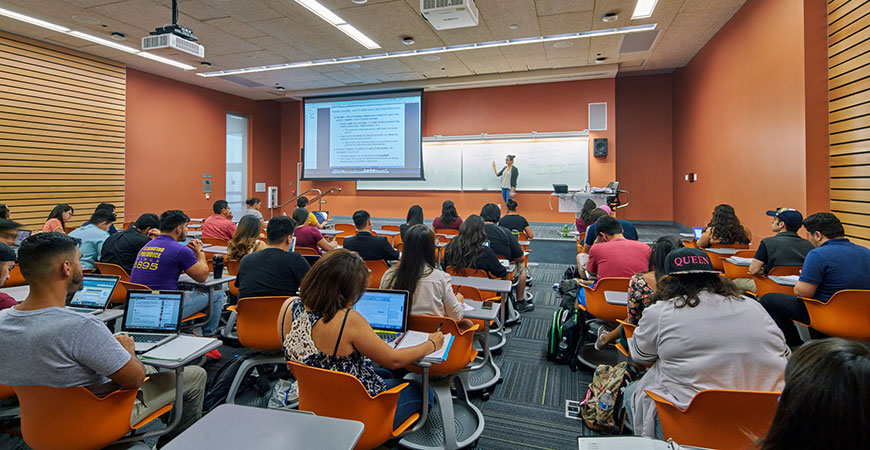
Current and prospective students are encouraged to submit a Free Application for Federal Student Aid (FAFSA) before the March 2 deadline.
January 23, 2018 - By Brenda Ortiz - The UC Merced Office of Financial Aid and Scholarships is committed to ensuring a world-class education remains within reach for all eligible students who need financial assistance to achieve their educational goals. The office focuses on student success by providing financial aid and advising services that support student recruitment, retention and timely degree completion.
According to StudentLoans.net, UC Merced ranked No. 1 out of 250 U.S. public universities for being the most affordable college for incoming freshmen with financial need. The campus also leads the list of top 250 public universities in the nation for offering first-year students the most need-based financial aid, according to a 2017 StudentLoans.net report.
Director of Financial Aid and Scholarships Ron Radney shares his top 10 tips to help students and parents navigate the process of applying for and receiving financial aid.
- Apply for Admission — Financial aid offices will typically determine aid eligibility only after a student has been formally admitted to the college and their financial aid application data has been received electronically.
- Apply for Financial Aid — Complete either the Free Application for Federal Student Aid (FAFSA), or the California Dream Act Application (CADAA), between Oct. 1 and March 2 (deadline for California) during your senior year of high school. For a list of FAFSA/CADAA workshops, check with a high school counselor or online at cash4college.csac.ca.gov. The FAFSA or CADAA must be completed annually to continue aid eligibility.
- Identify Special Circumstances — The FAFSA and CADAA require household income and tax information for the year prior to the last tax year (i.e., prior-prior year). If current household income is significantly less than the prior-prior year, contact the financial aid office to complete a special circumstance petition. Additionally, please make the financial aid office aware of any significant out-of-pocket expenses, such as medical, dental, etc., or any other special or unusual circumstances.
- Focus on Net Price — Apply to at least three colleges, including a dream school, a local school and a safety school. Don’t get discouraged by the sticker price. Once financial aid award offers are received, subtract the amount of total gift-aid offered from the Cost of Attendance to determine the Net Price at each college.
- Apply for Scholarships — Prioritize efforts beginning with institutional and regional scholarships before you spend much time searching for national scholarships. Institutional scholarship application processes and deadlines can vary dramatically depending on the school and system. Additionally, stay in contact with high school counselors for information on local scholarships, and avoid scholarship scams that ask for confidential information like social security number, date of birth, etc., and never pay to search or apply for scholarships. Make sure to report all outside scholarships received to the financial aid office so they can be included in the financial aid award package.
- Understand Student Loans Before you Borrow — Students may be offered federal student loans in their award package, but are under no obligation to accept these loans, or may elect to request a lesser amount. Loans might include a Federal Subsidized Loan (the student is the borrower and no interest accrued or payments made while enrolled at least half-time), Federal Unsubsidized Loan (the student is the borrower and interest accrues while in school, but there are no payments while enrolled at least half-time), and a Federal Parent PLUS Loan (a parent is the borrower, a credit check is required, interest accrues and payments begin after the loan is fully disbursed, but payments may be deferred). Upon request, there may be options to borrow private alternative education loans if needed.
- Pay Attention to Deadlines — Financial aid funds are limited. Priority consideration is given to students who meet application and document submission deadlines. Missing deadlines could result in forfeiting institutional grants, work-study awards and more.
- Monitor Email and Web Portal — The primary means of communication by financial aid offices is typically email, and most post requirements on a campus student web portal. Be sure to monitor both on a regular basis for important updates, communications, notifications and requirements.
- Communicate Housing Changes — Financial aid award offers are based in part on the housing status you indicated on your FAFSA or CADAA. Standardized Cost of Attendance budgets are used for students living on campus, off campus, or commuter (i.e., living with parent/relative). If a student changes housing status, it will likely affect their financial aid award package.
- Enrollment Status and Grades are Important — Grants must be prorated for students who are enrolled less than full-time. Continued aid eligibility is based on maintaining the college’s Satisfactory Academic Progress standards (e.g., GPA, Pace (the percentage of units competed), and maximum cumulative unit and time limits. Before dropping a class, be sure to consult with the financial aid office in advance to find out the potential aid eligibility impact.
For information or questions, contact the Office of Financial Aid and Scholarships at 209-228-7178.
Source: UC Merced








